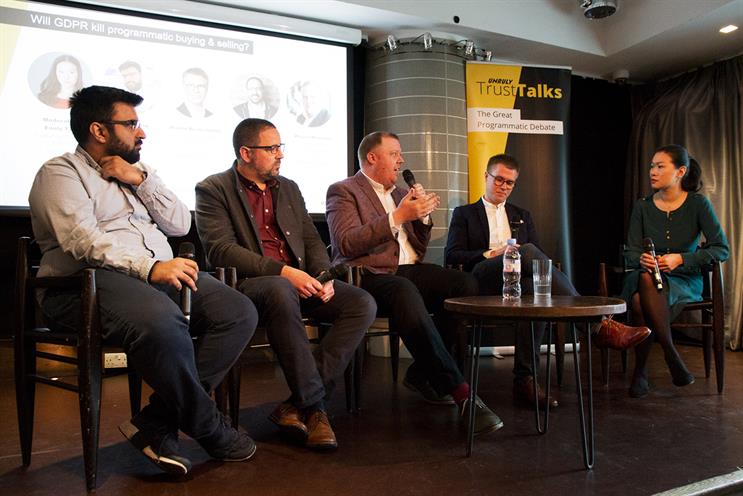
Speaking at an event organised by Unruly, Amir Malik, digital marketing expert, Accenture Interactive, agreed that UK's premium publishers have the opportunity to seize ad spend and investment from the duopoly of Google and Facebook if they band together.
"I'll be surprised if they're not already talking about it," Malik said, pointing to similar initiatives in and Portugal."
In an earlier panel, Karen Eccles, director of digital sales and innovation at Telegraph Media Group, agreed that the new regulations presented an opportunity for publishers, commenting: "GDPR is good news for publishers that have protected the relationship they have with users. GDPR puts the control back in the hands of those collecting data on users."
Other key takeaways from the event titled Trust talks: The great programmatic debate were:
Programmatic won't fall off a cliff after GDPR
While there will be a slowdown of spend flowing into programmatic, the entire business won't crash and burn agreed panellists.
"There will be a slowdown as spending shifts and data becomes more expensive, but programmatic media won't fall off a cliff," Philip Duffield, managing director of Ad Cloud Adobe EMEA, said. "Longtail retargeting will probably go away with GDPR."
Blockchain is not the first or simplest solution
While blockchain was floated as a solution to verifying data sources and media inventory, it is by no means the first or simplest solution available, agreed speakers. In fact, it's very likely tech-overkill.
The IAB US has proposed an upgrade to ads.txt, for example, called which uses cryptographically signed bid requests to show the path of inventory and authenticate that inventory. This, pointed out Mia Mulch, managing partner at Omnicom, would help manage supply chain issues.
"While slightly harder to implement than ads.txt, it's a fantastic initiative that is also much easier to roll out than blockchain," Mulch said.
Pure in-house programmatic by brands is not really happening
Although brands have been looking to hire programmatic talent, their hires are largely around strategy and not around tech implementation or even day-to-day executions Simon Harris, head of programmatic activation at Dentsu Aegis, noted.
"A study by the ANA in the US found that in cases where brands are in-housing some part of their programmatic media, eight out of ten times, someone from an agency is pushing the buttons," Harris said. "Further, most brands are satisfied with their performance of their agency-run campaigns. In total, only 11% of US advertisers surveyed were pushing buttons in-house."
The connected home will turn whitegoods brands into media owners
When a fridge, washing machine or toaster become potential platforms for ads, their manufacturers, unexpectedly, become media owners with all the responsibility that implies.
While Amazon may be fully aware of this, other brands new to the space such as Samsung, Panasonic and Whirlpool may be less so, pointed out Mary Keane-Dawson, chief executive and co-founder of Truth.
"We went wrong when we didn't think about the ethics of digital in the beginning. We have the opportunity to guide these clients who are about to be media owners and get it right this time," she said.
Ruth Zohrer, who heads connections planning, data and technology services at Mindshare, agreed with Keane-Dawson and cautioned the industry not to even consider looking at the connected home as just another ad platform.
"If we continue to ask ourselves the question: 'Can I place an ad on the fridge, or the smart speaker?' we’re going to fail. Marketing in the connected home cannot be about interrupting in the private space that is the home. The way in is the value-piece, to remove friction and increase convenience," Zohrer said. "While a lot of these new media owners will come up with ad propositions, we, as stewards for brands, have to ensure that we don't turn those brands into home-invaders."




.jpg)
.jpeg)
